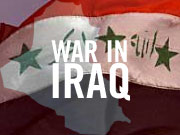Audio
Photos
More from MPR
Your Voice
| |||||||||||||||||||||||||||
As war continues, a Minneapolis bridge becomes Minnesota's town square
April 10, 2003
The war in Iraq may be entering its final phases, with U.S. troops wresting control of Baghdad from Saddam Hussein. But the weekly anti-war demonstrations on the Lake Street bridge between Minneapolis and St. Paul will continue. Peace activists who gathered there Wednesday night say the issues surrounding the conflict haven't disappeared. They say they'll continue protesting what they calling imperialist foreign policy objectives.
Minneapolis, Minn. — Along with the usual signs found at anti-war protests, several people, including Lynn Elling, waved a United Nations flag.
Elling was a Navy officer in World War II and the Korean War. He says doesn't agree with the Bush administration's view that the U.N.'s role in rebuilding Iraq should be limited.
 | |||
"It's wrong. And that's why I'm out here protesting," Elling says. "I think the U.N. should play a major role. I'm a loyal American too, but I'm also a loyal world citizen, and that's what we've got to promote."
David Sutton also waved a U.N. flag. Sutton is with the Minnesota Chapter of the United Nations Association, a group supporting stronger U.S. involvement in the U.N.
"The bigger the role the better for the United Nations, and certainly giving it legitimacy of that United Nations effort would help us in the credibility of the rebuilding effort. Eventually, though I think even in the administration they're backpeddling very quickly on this, and admitting after having bashed the United Nations for so many months now, to turn around and say, well of course we need the United Nations, we were just kidding when we said it was no good," Sutton said.
About 250 protesters showed up to the Lake Street bridge for what's become a weekly vigil over the past several years, first opposing sanctions against Iraq, and now the war.
 | |||
Many, including Jyothy Pothapragada seemed unimpressed by the day's unrelenting news and TV images of U.S. Marines and Iraqis toppling a Saddam Hussein statue and the implication that the regime has fallen.
"The fighting is not over. And it is still continuing. There's a lot of different ways to for people to become liberated. And one of the things that we've done is we've kept them down and kept them weak for a really long time. And after they're weak, we go in and rescue them. And I think we have a lot of ulterior motives for being over there besides just liberating the people of Iraq. We didn't seem to care about their liberation as long as their regime went along with our agenda," Pothapragada says.
The vigil attracted a handful of counter protesters. One woman stood balanced on the bridge's inside rail and sang extended choruses of God Bless America while holding a Liberate Iraq poster.
The man who created that sign, retired Lt. Col. Joe Ripya, was also on the bridge. It was his first time there. "I fought two wars so they could have the right to stand out here and make fools of themselves. And basically what they're saying is they're more interested in seeing a nation held under the thumb of a ruthless dictator and they support his rape and pillaging of his own country."
Toward the end of the vigil, three young Iraqi men appeared on the bridge with signs thanking the U.S. for liberating their country. The men engaged a few of the protesters in discussion.
Peace activist Phil Steiger spoke with Yacob Aljaffery and Rahim Al Shamary about the recent events in Iraq.
"We are with peace. All the human beings. The nature of human beings peace, except some people like Hitler and Saddam and some other people," said Aljaffery said.
"And for 10 years the United States paid Saddam Hussein in the '80s while he was persecuting the Iraqis. The Reagan administration for 10 years," Steiger said.
The peace activists say they'll continue speaking out against U.S. policy . They say they're concerned the U.S. has started on a path that will lead to further bloodshed and more anger against Americans.
|
News Headlines
|
Related Subjects
|


